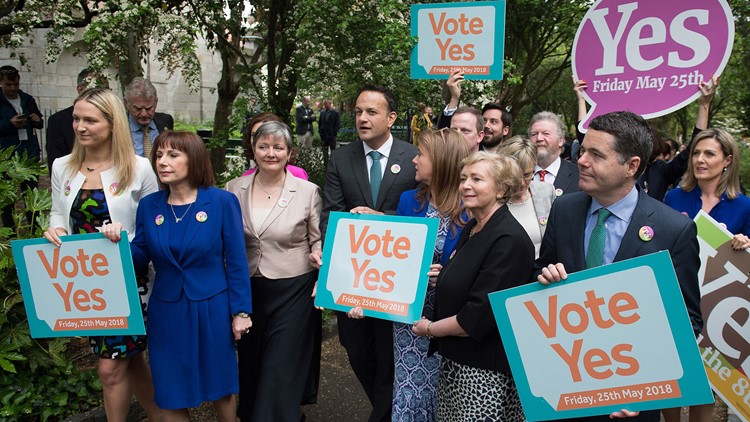Irish voters overwhelmingly supported a repeal of Ireland's constitutional ban on abortion Saturday in a sweeping cultural change representing a move away from the nation's conservative Catholic roots.
The final tally showed that 66.4% backed the repeal out of 2.1 million votes cast, according to election official Barry Ryan, who made the official announcement.
The exits polls by state broadcaster RTE television and the Irish Times newspaper indicated approximately two-thirds of voters supported overturning one of the strictest abortion laws in the world. One-third opposed it.
Official results are due later Saturday.
If the exit polls are confirmed by the vote count, Ireland's government will seek to pass legislation that allows abortions during the first 12 weeks of pregnancy. The current law prohibits all abortions in Ireland, except in cases when the woman’s life is at risk, and having an illegal abortion is punishable by up to 14 years in prison.
While Ireland's center-right Prime Minister Leo Varadkar, who campaigned to repeal the Eighth Amendment, stopped short of claiming victory based on the exit polls, he appeared confident. "It’s looking like we will make history," he tweeted late Friday.
Varadkar followed that up Saturday, saying "what we've seen today is the culmination of a quiet revolution that's been taking place in Ireland over the last 20 years."
The projected result drew strong reaction from abortion rights activists and opponents.
"Abortion on demand would deal Ireland a tragic blow but the pro-life movement will rise to any challenge it faces," said Cora Sherlock, an abortion rights objector.
John Aidan Byrne, 58, an Irishman who has lived in the United States for more than 30 years and runs a group called Irish Pro-Life USA, said that doing away with the ban would mean "fewer protections" for his friends and family in Ireland.
"Once you introduce legalized abortion it changes the entire dynamic of society. And it divides it politically, socially and — let's be frank — spiritually," he said.
But others viewed the likely result as evidence that Ireland, for years held back by traditional voices in the church, was embracing tolerance and progressiveness as well as continuing down a path of liberalization after national votes in recent years that ushered in legalizing contraception, divorce, homosexuality and same-sex marriage.
"We woke up this morning to a new Ireland. Ireland’s changed," said Deidre Duffy, one the organizers of the campaign to change Ireland's abortion law.
"One by one, the manacles imposed by clerical control and society's deference to it have been removed, and Ireland has altered beyond recognition," said Martina Devlin in a column for the Irish Independent newspaper Saturday.
Lawyer Anna McCarthy, 35, was standing near a Dublin mural on Saturday of Savita Halappanavar, a 31-year-old Indian dentist who died in Galway in 2012 due to blood poisoning resulting from a miscarriage after she was denied an abortion.
Halappanavar's death helped galvanize efforts to change Ireland's abortion laws.
"This is something to be celebrated," McCarthy said.
"Finally, we're not shaming women, we're not punishing them, or judging them — we're just going to have a law that supports people in crisis. This is a win for everybody."
Messages of condolence were affixed to a wall next to the image of Halappanavar.
"This should NEVER have happened to you," read one. "Our babies were only six weeks apart, you inspired me and the whole nation to say NEVER AGAIN."
A post shared by Kim Hjelmgaard (@khjelmgaard) on
Repealing Ireland's Eighth Amendment that gives equal protection to a fetus and the woman would bring the once-staunchly Catholic country in line with abortion practices in the United States and the majority of Europe.
It would leave only three places in Europe where abortion is illegal unless the woman's life is at risk: tiny Andorra and San Marino, and Malta. Four countries around the world do not allow abortions under any circumstances, according to the Pew Research Center. They are the Dominican Republic, El Salvador, Nicaragua and Vatican City.
"It’s a very emotional day," said Simon Harris, Ireland’s minister for health, speaking to media at Dublin Castle, where the results of the vote will be announced.
"Over the last 20-30 years the idea of Ireland as a Catholic country has been changing," said Mary McAuliffe, a gender studies expert at University College Dublin.
"We're no longer an isolated country on the edge of Europe hidebound by outdated ideas about morality, femininity and controlling women's bodies," she said.



